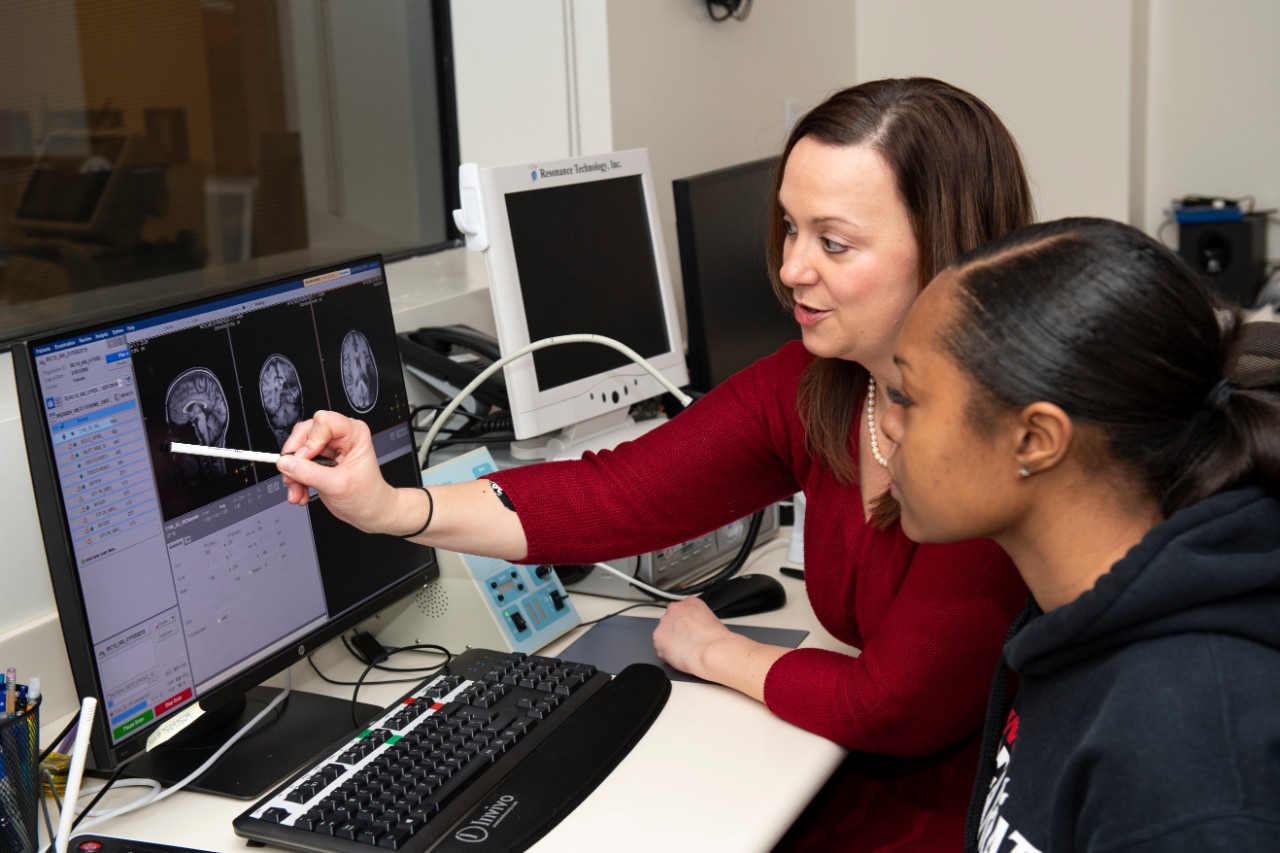
Neurorecovery team leads innovative stroke research
Interdisciplinary group of researchers come together to form UC’s Neurorecovery Laboratory
When someone is having a stroke, every second counts. That’s why the University of Cincinnati prides itself on being an international leader in treatments for acute stroke designed to completely reverse the stroke within the first few hours. But what happens when a stroke can’t be prevented, or medical attention isn’t given within those first precious hours? The result is more than often a long and difficult road to recovery.
In 2016 the University of Cincinnati Neurorecovery Lab was formed to make this road to recovery a little easier. The vision of the accompanying Neurorecovery Team is to help people who have suffered a stroke or other neurological disorder (e.g. traumatic brain injury, multiple sclerosis, Parkinson’s disease, spinal cord injuries, etc.) as well as their family caregivers to have a greater quality of life by researching and developing novel interventions, discovering brain-behavioral relationships and identifying better recovery processes.
Neurorecovery is an emerging field. As one of the next great frontiers in science involves research into the brain’s structure and function, a primary research focus is to harness the power of neuroplasticity—the biological property of remaining brain tissue to take over the functions from injured brain (e.g. after stroke). Studies on reintegration into society, caregiver health/burden, and other psychosocial aspects of life after brain injury will complement these studies.
The Neurorecovery Lab space is located in the Medical Sciences Building at the UC College of Medicine and is equipped with state-of-the-art equipment. The research is primarily clinically based and patient centered. The team is currently made up of investigators from three colleges: Allied Health Sciences, Medicine, and Nursing. Members have expertise in neurology, physical and rehabilitation medicine, physical therapy, occupational therapy, speech/language pathology, nursing and previously, social work.
“The interdisciplinary nature of our Lab affords us the ability to address the multi-faceted recovery needs of stroke survivors and their co-survivors. Ultimately, this helps us improve their quality of life through our research.”
Aimee Dietz, PhD
The team aims to empower people neurological disorders and family caregivers to enhance quality of life through the development of novel interventions, discovery of brain-behavior relationships and identification of recovery processes.
A major collaborative accomplishment thus far has been the launching the stroke recovery database. The database was created to increase patients’ awareness of stroke research and streamline the study recruitment and process for investigators and study participants. To date, the database includes over 815 stroke survivors within the Greater Cincinnati Region and more than 200 have participated in one or more Neurorecovery Lab study.
These studies include a NIH-supported multicenter clinical trial on high intensity training post-stroke (PI: assistant professor in the Rehabilitation, Exercise and Nutrition Sciences department Pierce Boyne, PhD) and three NIH clinical recovery studies (TRANSPORT-II, SLEEP SMART, ROSE) as well as one of three other NIH-funded studies and two foundation-funded (AHA/ASA and AAN) studies.
Together, these studies have had support totaling over $5.5 million and led to more than 28 peer-reviewed publications and 37 scientific presentations.
Research assistants and numerous students also actively support funded research protocols, giving the lab another purpose. Communication Sciences & Disorders Professor Aimee Dietz’s study of augmentative and alternative communication-induced language recovery in post-stroke aphasia is funded by the NIH R15 mechanism which purposely seeks to expose students to research. A total of 61 trainees have participated since the Lab opened.
Many the studies were forced to pause their studies in March due to the Coronavirus (stroke patients are an at-risk population). However, this fall they have been able to revive some of the studies using teletherapy and protocols that include extra precautions.
UC/Academic Health Center Faculty/Staff Team Members:
- Pierce Boyne
- Aimee Dietz
- Kari Dunning
- Valerie Hill
- Jennifer Vannest
- Xiao Song
- Erin Wagner
- Tamilyn Bakas
- Elisheva Coleman
- Brett Kissela
- Oluwole Awosika
- Elaine Miller
Current Student Members:
Speech-Language Pathology
- Chitrali Mamlekar (PhD student)
- AnnaKate Spotts (PhD student)
- Cassandra (Cassy) Stall (master’s student)
- Delaney Turner (undergraduate student)
- Sara Clevidence (undergraduate student)
- Naomi Jackson (undergraduate student)
Physical Therapy
- Abigail Laughlin (DPT student)
- Jamiah Burson (DPT student)
- Alli Horning (DPT student
Neurology
- Jamiah Burson (DPT student)
- Abigail Laughlin (DPT student)
Featured Photo at top of Aimee Dietz, PhD with former Neurorecovery lab student member Mariah Emory by Colleen Kelley/UC Creative + Brand
The University of Cincinnati is leading public urban universities into a new era of innovation and impact. Our faculty, staff and students are saving lives, changing outcomes and bending the future in our city's direction. Next Lives Here.
Learn more about Research at the University of Cincinnati.
Related Stories
Before the medals: The science behind training for freezing mountain air
February 19, 2026
From freezing temperatures to thin mountain air, University of Cincinnati exercise physiologist Christopher Kotarsky, PhD, explained how cold and altitude impact Olympic performance in a recent WLWT-TV/Ch. 5 news report.
Blood Cancer Healing Center realizes vision of comprehensive care
February 19, 2026
With the opening of research laboratories and the UC Osher Wellness Suite and Learning Kitchen, the University of Cincinnati Cancer Center’s Blood Cancer Healing Center has brought its full mission to life as a comprehensive blood cancer hub.
Nursing innovation emerges as critical lever in healthcare transformation
February 18, 2026
Recognizing both the urgency and the opportunity, the University of Cincinnati (UC) College of Nursing is taking deliberate steps to position nurses at the forefront of healthcare transformation. It has created an Innovation Strategic Plan and established a dedicated Industry Advisory Board to forge the academic-industry partnerships essential to accelerating nurse-driven innovation.